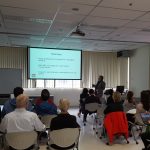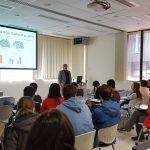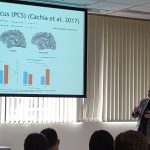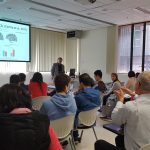Abstract
A majority of the global population is multilingual. Although studies have investigated the processes used to produce words in multilingual speakers, one criticism of this research is the emphasis on Indo-European languages including English as the dominant language. The question posed in this presentation is whether cognitive processes that have been assumed in all models of language processing (naming, reading and spelling) extend to multilingual speakers. This is not a trivial question. Multilingual speakers can use very different writing systems. Indeed, even within a language e.g. Japanese and Korean – two or more scripts must be learned to become literate (monolingual bi-scriptals). If the same cognitive mechanisms used to read, spell and write in one type of script have an impact on reading and spelling in different scripts then several clinical and pedagogical implications arise e.g. in diagnosis and treatment of aphasia, dyslexia and dysgraphia in multilingual speakers. One feature of the presentation will be cases of multilingual speakers who display reading and writing disorders in typologically different scripts. These cases highlight the many similarities across languages.
Speaker
Professor Brendan Weekes
Director of the Language, Science and Disorders Laboratory; Professor, Chair of Communication Science, HKU
About the Speaker
Weekes’s training was in experimental psychology (psycholinguistics) and neuropsychology at the University of Melbourne. His research interests then evolved into a specialisation in language disorders with a focus on aphasia and literacy (dyslexia). Weekes co-established the Sino-UK Laboratory for Communication Science in Beijing and continues his collaboration. His theoretical framework of multi-scriptalism in bilingual aphasia and language disorders in Chinese has motivated hundreds of publications and has become key reference. Weekes was the first in the world to conceptualise the effect of a multilingual environment on aphasia and literacy with implications for development of theoretical models of reading and writing and he was a pioneer in the use of brain imaging for the study of bi-scriptalism (Chee et al., 2000, 2001). In 2010, he established the Laboratory for Communication Science at HKU winning funding for a suite of new neuroscience technologies used for the first time in a Faculty of Education (EEG; Eye Tracking; fNIRS; MRI; TMS). Since the award of tenure in 2013 at HKU, Weekes has moved on to publishing research on aphasia and literacy in over twenty languages and was instrumental in founding the new Laboratory for Neuroscience in Education at HKU. His work is marked by a relatively high h index=31 for Education and also for a researcher in the fields of Experimental Psychology, Neuropsychology and SHS.
Date
26 February, 2018
Time
12:30-2:00pm
Location
Rm 205, Runme Shaw Building
Chair
Dr. Yuen Yi Lo
Presentation Slide
Presentation Slide 1 :
- ‘Curses in TESOL’: Postcolonial Desires for Colonial English
- “Enhancing Data-Driven Learning in Disciplinary L2 English Contexts: Introducing CorpusMate”
- “Neither Bilingual nor Education”: critiques of bilingual education in state school education and responses to them
- A Two-Tiered Investigation Into the Dual Goal in EMI Education: Assessment and Instructional Practices
- Acculturation and digital trans-literacies in identity construction: An interdisciplinary perspective (Nov 6th, 2025)
- Appropriation of Resources by Bilingual Students for Self-regulated Learning of Science
- Auckland U – HKU Joint Webinar (28 November, 2024)
- Automated Content Feedback and Young English Learners’ Behaviours, Performances and Response
- Book Launch Seminar: Language Across the Curriculum & CLIL in English as an Additional Language (EAL) Contexts
- Critically Engaged Literacy Workshop as Decolonial and Anti-Racist Pedagogy (April 16th, 2025)
- Crosslinguistic influence in foreign and second language learners
- Developing Language Educators’ Understanding of Assessment Reform Discourse and Practices: School-University Collaborative Action Research as Praxis
- Digital literacy pedagogy:
Key issues in the age of Gen-AI
- Digital Multimodal Composing for Specific Purposes: The Case of Sustainability Discourse
- EMI Symposium 2023: Fostering Collaboration
- Exploring Self-Regulated Use of Artificial Intelligence Tools in Language Learning
- Generative AI: Implications and Applications for Education
- Global Englishes-informed Teacher Education: Present Cases and Future Directions
- HKU-NCL Joint Webinar (Nov 27th, 2025)
- HKU-Newcastle U Joint Webinar: Critical Perspectives on Language Policy and Practice (May 2nd, 2025)
- HKU-NIE Joint Webinar: Designing Learning and Assessment with Multimodality in CLIL Classrooms
- Hong Kong SAR Government’s ‘Biliteracy and Trilingualism’ Policy: Sizing Up and Meeting the Challenge
- Hong Kong Students’ Self-regulated English Writing for Academic Studies
- HUMANISING TECHNOLOGY in Language Learning & Teaching
- Interactional Reflexivity in the Age of AI: Rethinking L2 Writing Teachers’ Assessment Literacy Development (Oct 9th, 2025)
- Language ideologies in text-based art of Xu Bing: Implications for language policy and planning
- Language Learning in 3D Virtual Worlds
- Learning about and using academic vocabulary: Critical issues for pedagogy (Feb 18, 2025)
- Motivational and Empowering Feedback in the Writing Classroom
- Multilingualism and its Ramifications
- Multilingualism and Mobility: The Semiotic Production of Centres and Peripheries in Airport Spaces
- Narrative Skills in Mandarin- English Dual Language Immersion Learners
- Narratives of Cross-Cultural Understanding among South Asian Diasporic Students in Hong Kong
- NCL-HKU Joint Webinar (June 5th, 2025)
- Newcastle U-HKU Joint Webinar on Cultural Artifact Creation (14 November, 2024)
- Oklahoma U-HKU Joint Webinar (05 December, 2024)
- Optimising Classroom Learning: Speaking in and about Mathematics Classrooms
- People who come from state education are different”: How language use maintains social exclusion in Medical Education
- Policy vs Practice: Homework in Hong Kong EFL Classrooms
- Review of recent research on AI-powered technology in second language teaching, learning and testing (Feb 10, 2025)
- Revival and Threat: Language ideologies, policy, and nationalism in Kazakhstan and Mongolia
- Secondary school students’ source use in inquiry project-based learning (PjBL): Working towards avoiding plagiarism and engaging with sources
- Sociocultural awareness of international ELT policies: The case of a US-funded program in Morocco
- Studies of Public Policy Process and Implications for Research on Education Policy
- The Challenges of Teaching Non-Chinese Speaking Children to Learn Chinese at Kindergarten Level
- The Contributions of Growth Rates in Phonological and Spatial Abilities to Chinese Reading and Mathematical Competencies: A Longitudinal Study of Hong Kong Kindergarteners
- The Digital Literacies Forum 2023
- The Effects of the Medium of Instruction in Physics on Achievement and Motivation to Learn
- The Historical and Linguistic Background of South and Southeast Asian Multi-ethnic Communities in Hong Kong
- The Influence of Extramural Access to Host Culture Social Media on Ethnic Minority Students’ Motivation for Language Learning
- Top desk rejection reasons and how to avoid it
- Translanguaging in Everyday Textual Performances: Implications for Literacy and Pedagogy
- Understanding Language Learning Motivation in Hong Kong
- University of Melbourne – University of Hong Kong Joint Symposium (19 November, 2024)
- Using Reading to Learn Pedagogy to Support Non-Chinese Speaking Students Learning Chinese in Hong Kong
- Videos in language classrooms: A social semiotic perspective
- What can we learn from the Hong Kong Archive of Language Learning Project?
- New technologies in literacy research:
“Measuring” embodiment through
galvanic skin response
- Publishing in top-tier applied
linguistic journals:
Perspectives of an editor�reviewer-author






